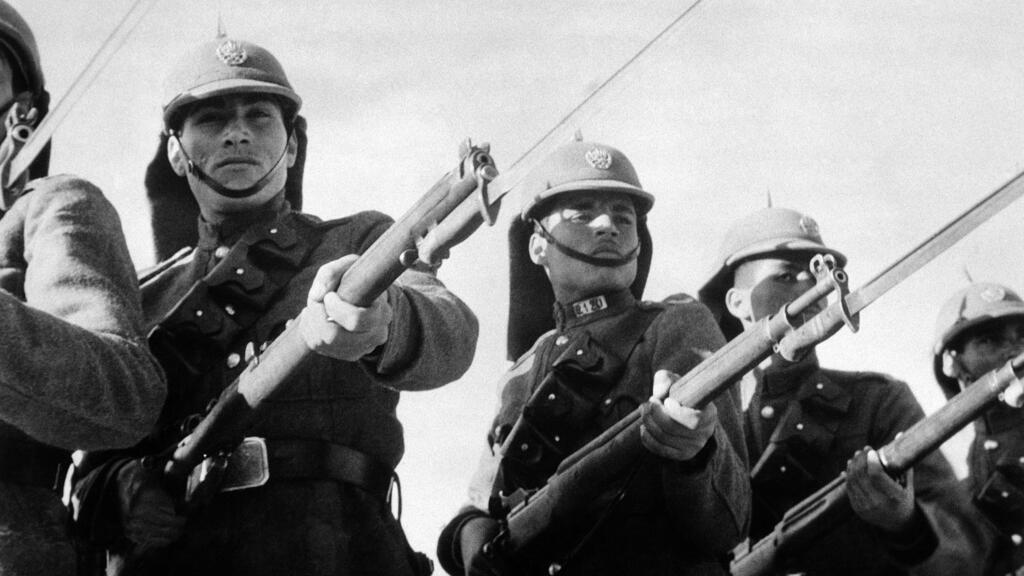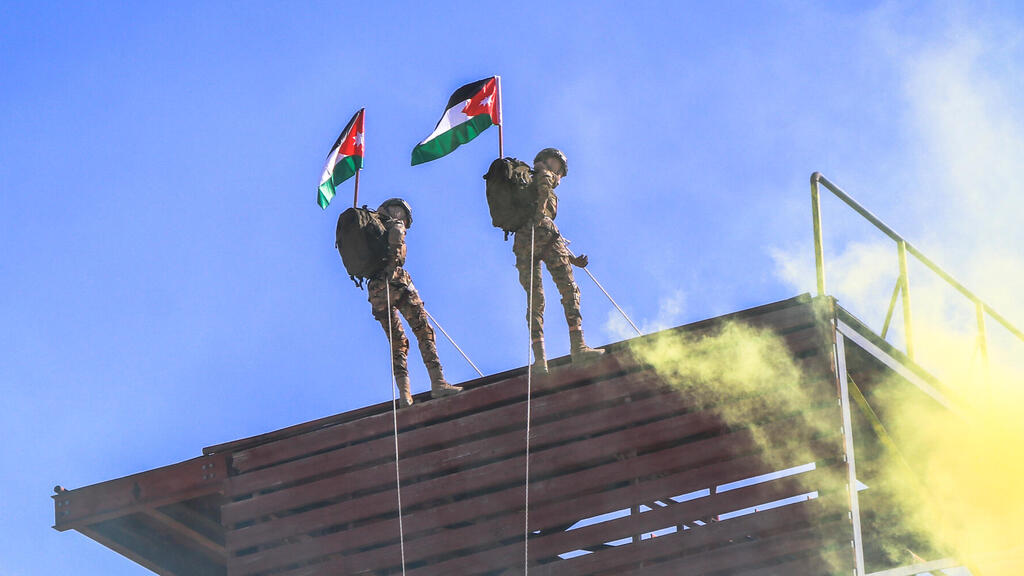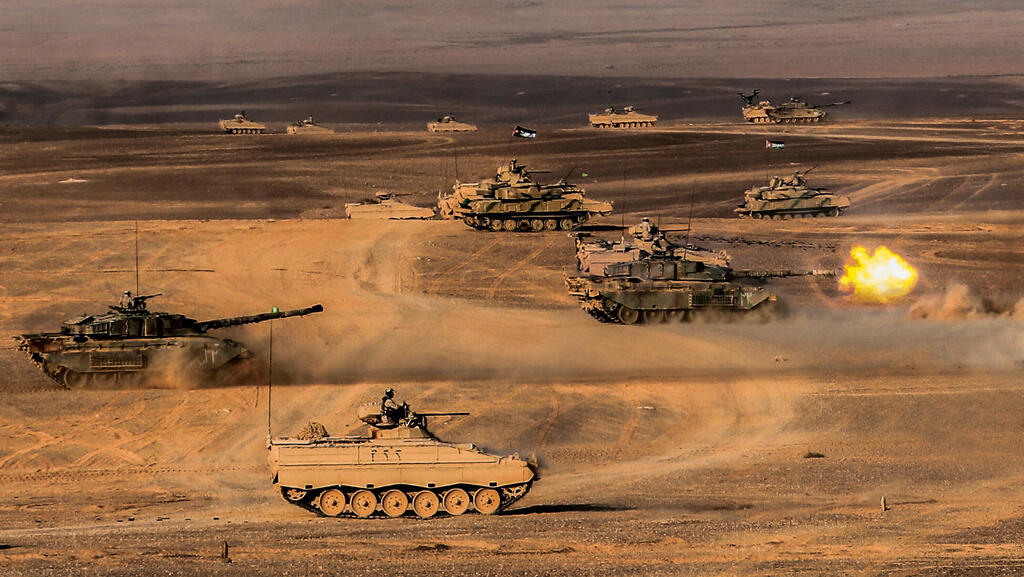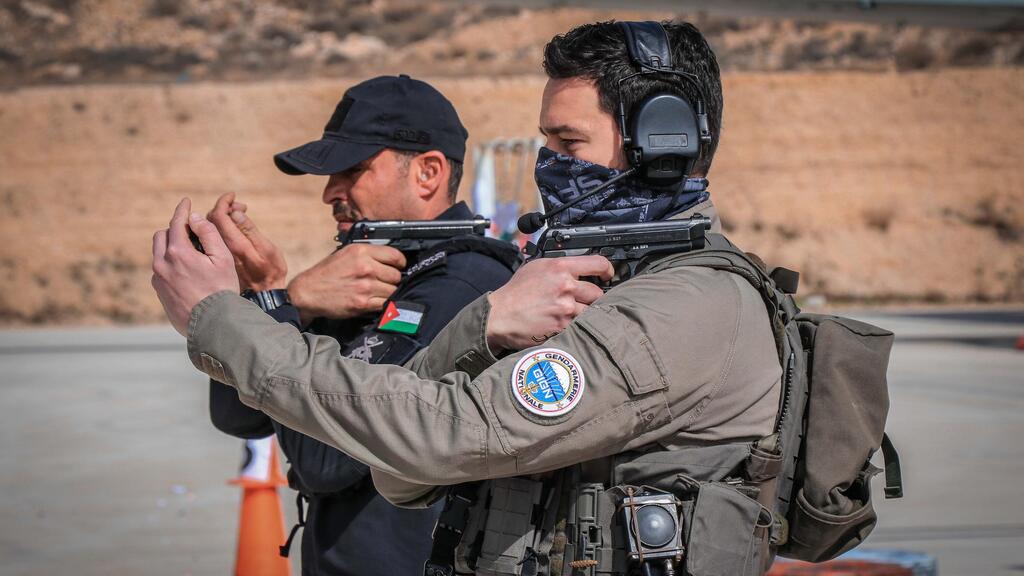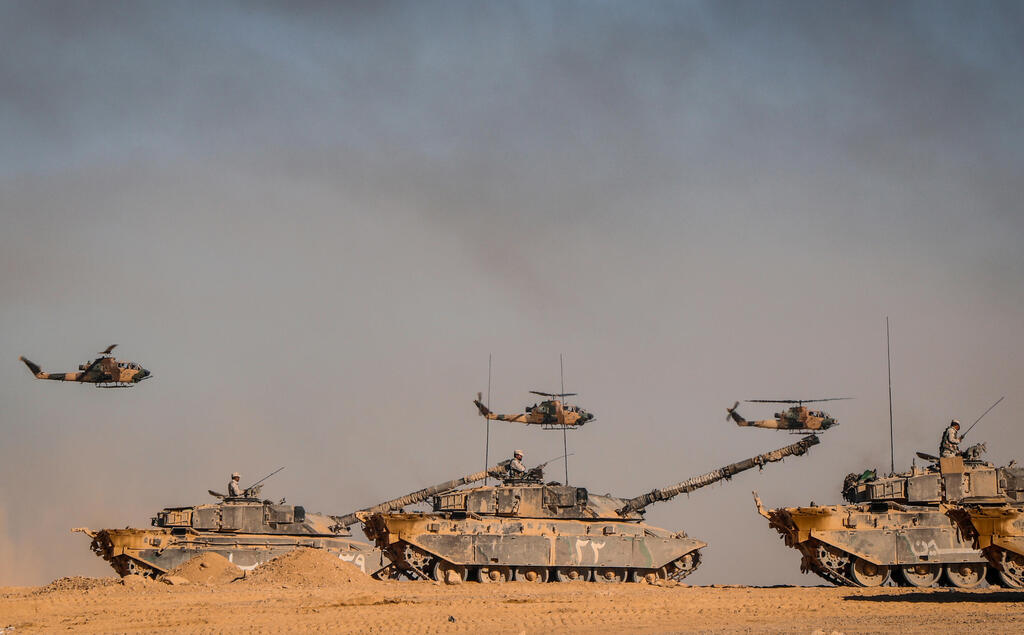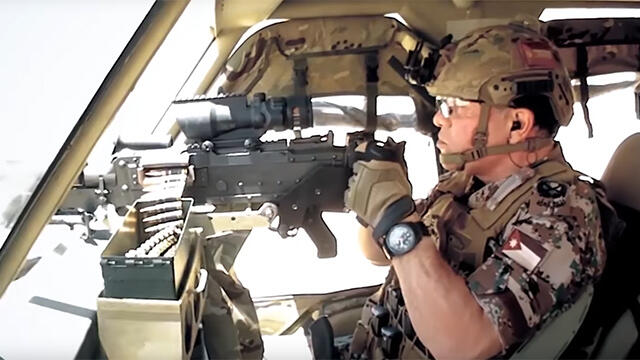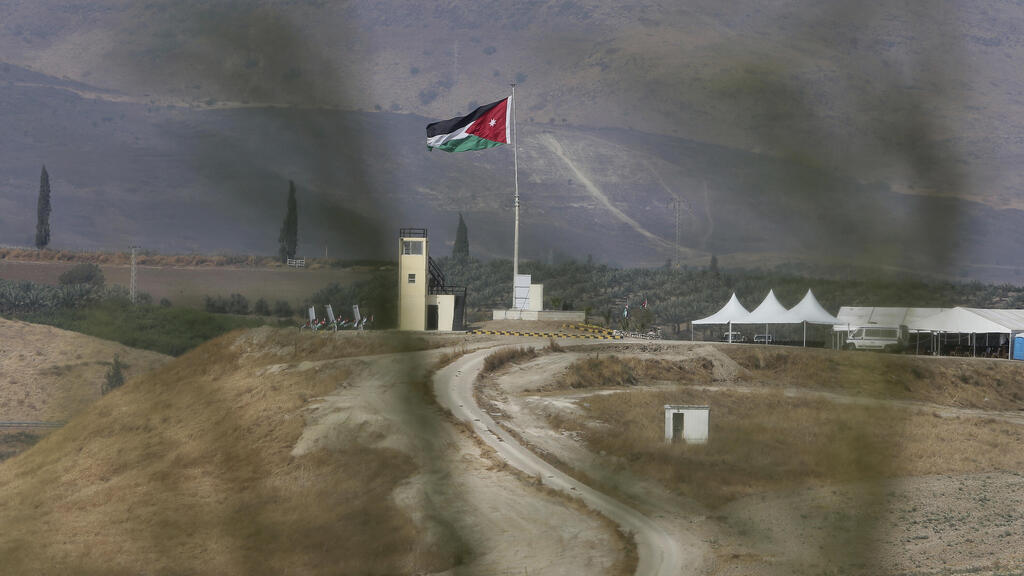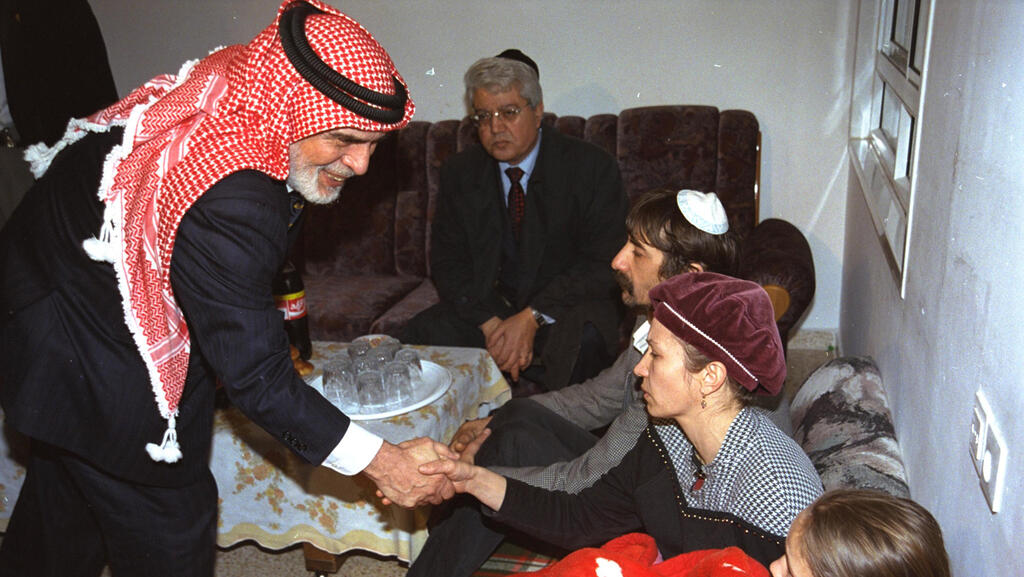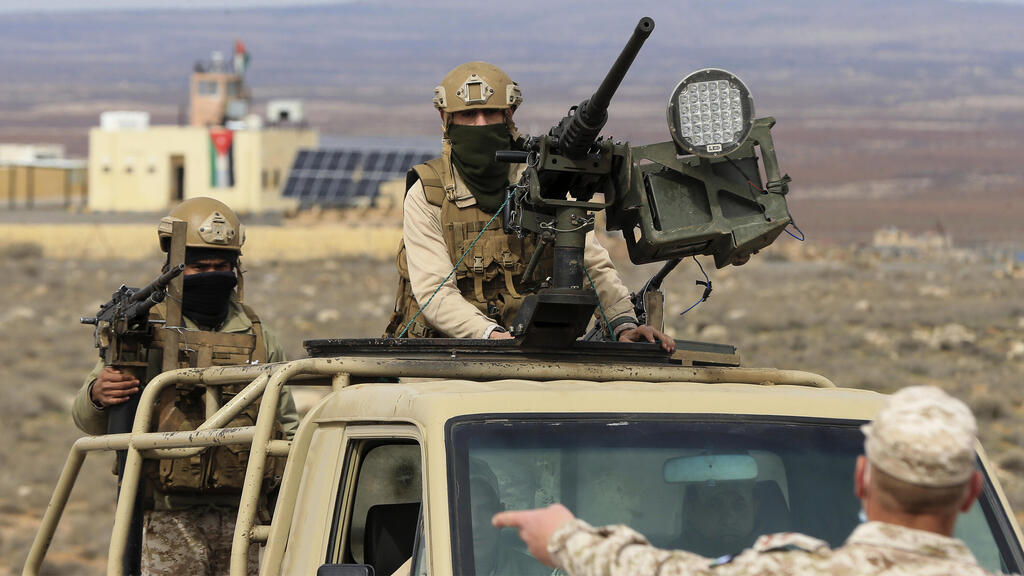Getting your Trinity Audio player ready...
Jordanian military in action
(Video: via Youtube)
For decades, the Jordanian army was known as the “Arab Legion” and was initially led by British generals. Today, the Americans contribute significantly to the military operations of the country. Despite these changes, the army has remained stable, never staging coups but consistently upholding its declared mission - to protect the Hashemite regime.
The origins of the Jordanian army date back to the early 1920s. In the late 20s, the British, who then controlled the country, established the Arab Legion to promote their interests in the Middle East.
10 View gallery


Members of the Arab Legion surrounding Israeli forces after taking control of Jerusalem's Old City
(Photo: AP)
“With the establishment of the Emirate of Transjordan in 1921, the Arab Legion became a force whose main purpose was to protect the Hashemite regime,” explains Prof. Ronen Yitzhak, head of the Middle Eastern Studies Department at the Western Galilee College. “The Hashemite regime did not initially gain legitimacy. There were attempts to undermine its status, and the Arab Legion, led by a British officer, was intended to protect it.”
The Arab Legion was considered one of the strongest forces in the Middle East and notably participated in the Arab armies’ attack against the small, nascent State of Israel during the 1948 War of Independence.
London remained Jordan’s main patron until the late 1950s. However, British support gradually waned as Jordan became more independent. “As part of Jordan’s history, political and military ties were forged with Great Britain,” explains Prof. Yitzhak. He noted that the UK supported, funded and armed the Jordanian army; therefore, the military’s means of warfare were mostly British.
On March 1, 1956, King Hussein dismissed the British chief of staff of the Arab Legion, General Glab Pasha, and the army transformed into the Jordanian Army. A year later, the socialist government established in Jordan canceled the agreement with the UK. Gradually, the United States assumed the role of the supporting patron, a role it continues to play to this day.
“The one who made the unilateral decision to break the alliance with the British was made by Prime Minister Suleiman Al-Nabulsi. In early April 1957, King Hussein dismissed him, recognizing that the orientation would shift from pro-Western to pro-Eastern,” explains Prof. Yitzhak.
“Thus, contacts with the U.S. began, driven by its interest in keeping Jordan aligned with the Western bloc. This shift was a significant reason for the change in U.S. policy regarding arms in the Middle East, and the decision to sell weapons to Jordan in the mid-1960s.
Israel also played a significant role in the American decision to assist Jordan. “Israel pushed the Americans toward this move. As early as 1958, Israel shaped its policy, which remains to this day - that maintaining Jordan’s independence and territorial integrity is an Israeli interest,” explained Prof. Yitzhak.
“The Americans sold tanks to Jordan with Israeli support, to strengthen the Jordanian regime, on the condition they would not be stationed in the West Bank. They also started selling them planes and other weapons, and to this day, Jordanian military officers train in military colleges in the U.S. and UK.”
Like Israel, Jordan is a non-NATO ally, giving its relationship with the United States significant military importance. “This allows the deployment of forces in Jordan and the development of a weapons industry and it signifies the level of relations and trust the Americans have in Jordan. Jordan receives the largest military aid from the U.S. after Israel - $1.4 billion, more than Egypt receives,” explains Prof. Yitzhak.
“A few years ago, a secret agreement was signed between Jordan and the U.S., allowing the American military free access to 12 major military bases in the country. The agreement was signed by a special order of the king, without the information being passed for parliamentary approval, only to the prime minister,” he added. "Today, there is an American presence of about 3,000 soldiers in Jordan routinely, and some claim there are even twice as many."
Mandatory recruitment for the unemployed
Jordan's economic situation is dire. Despite this, the government increased the defense budget for 2024 to address new challenges. According to an Al Jazeera report from the beginning of the year, the Jordanian parliament approved a budget considered the largest in history in terms of military expenditures. Despite the enormous budget, Jordan's military power is ranked 80th out of 145, according to the GlobalFirePower website.
According to CIA data, about 100,000 soldiers and officers currently serve in the Jordanian army. The Air Force has about 50 American-made fighter jets and dozens of attack helicopters, while the Navy uses fast-armed patrol boats and missiles to monitor Jordan's coastline in the Gulf of Aqaba. The American intelligence agency noted that Jordan hosts an international training center for special operations.
Mandatory service was canceled in 1991 it was partially reinstated in 2020. Then-prime minister Omar Razzaz ordered mandatory enlistment for unemployed individuals aged 25-29. This mandatory service lasts for one year and includes three months of military training and nine months of professional and technical training to provide them with a profession.
A year earlier, Jordan introduced a voluntary National Military Service program for unemployed individuals aged 18-25 who had been jobless for at least six months. The program lasts four months, with the first month dedicated to military training and the following three months to professional training in the construction and tourism sectors.
The senior command echelon of the army is quite limited and hails from the Jordanian elite, about 50 families who have held key positions since the country's establishment. No matter how capable a soldier is, even if he is Jordanian by birth, he will not reach the senior command if he is not part of these families.
"In recent years, there has been no discrimination against Palestinians in Jordan. The Jordanian intelligence does not see a threat from Palestinians in the country, so they are integrated into the army. This is why you can see pilots, intelligence personnel and officers of Palestinian descent," said Prof. Yitzhak.
One of the special units established in the last decade in the Jordanian army is the counter-terrorism unit. This unit was formed following the terror attack on three hotels in Amman, which killed 67 people and injured hundreds more.
"The unit was trained by the Americans. We know that Jordan is a relatively stable country security-wise. There are good intelligence mechanisms, cooperation with Western security agencies and counter-terrorism activities within and outside Jordan, so we do not see many terror attacks in the country," explained Prof. Yitzhak. "Al-Qaeda and ISIS initially had legitimacy in Jordanian public opinion, but after the terror attack, the public recognized them as terrorist organizations."
Defenders of the Hashemite regime
The Jordanian army also serves to maintain order within the country and continues to protect the Hashemite kingdom. "Compared to other armies in our region, it is almost the only army that has not experienced military coups. It is the most stable and long-standing regime in the area," noted Prof. Yitzhak, while immediately mentioning several failed coup attempts in Jordan inspired by Arab nationalism in the 1950s and 1960s.
One reason for this stability is the close relationship between the Jordanian royal family and the army. The king is the "commander-in-chief of the Jordanian armed forces," above the chief of staff, and the only one who can declare war or sign a peace agreement.
King Abdullah II previously served as the commander of the Jordanian Special Forces, a unit that is both operational and intelligence-based, maintaining ties and cooperation with allied military units, including Israel. Therefore, he understands very well the significance of strategic cooperation with the neighbor to the west.
"But the entire royal family is closely linked to the military. A few days ago, photos were published of the heir to the throne, Hussein bin Abdullah, prior to the rank of Ra'id (equivalent to lieutenant colonel) in the Jordanian army. Hussein studied at the Royal Military Academy Sandhurst in the UK and occasionally participated in military exercises of the Jordanian army.
Also, the king's daughter, Princess Salma, has military training. The 23-year-old princess is a pilot in the Jordanian Air Force and participated in humanitarian aid drops in Gaza during the ongoing war.
"The Jordanian army has an important societal role in promoting the status of women in the country," Prof. Yitzhak explained. "Women's participation in the Jordanian army is higher than their average participation in the labor force in Jordan. Salma is the first female military pilot and serves as a role model for Jordanian women." However, according to CIA data, the percentage of women serving is 3% of the total personnel in the Jordanian army.
Trust in Israel remains intact despite difficulties
Although in the early years, the Jordanian army was a bitter enemy, there has been long-standing security and military cooperation between Israel and Jordan. Even in the current period, when senior officials in the country express opposition to Israel and crowds protest outside the vacant embassy in Amman, security cooperation has not been affected. Alongside recent developments in the region, both countries have strong shared security interests and deep relations that go back many years.
For example, in 2021, Jordanian intelligence reportedly arrested four ISIS operatives who planned to attack IDF soldiers stationed near the Jordanian border. According to the report, the four cell members planned to clash with Jordanian border guards and then advance toward IDF soldiers to kill them.
One of the evident interests is the fight against global terrorism, and a good example of this is the confrontation with the ISIS threat in Jordan. According to reports, Israel collaborated with other Arab countries long before normalization agreements, such as the UAE or Saudi Arabia, in the war against ISIS. The command included representatives from Arab armies and Western military forces, including Israel, and was established in Amman.
"This is evidence of a strategic alliance between the countries, even if there is no peace agreement between them, and it cannot be severed overnight," Prof. Yitzhak said, emphasizing, "Thanks to the strategic cooperation between the countries, there is confidence between the Jordanian king and our military-security establishment."
Over the years, there have been tensions between Jordanian soldiers and the army in the joint border area, the deadliest of which was in 1997 at the "Island of Peace massacre." A Jordanian soldier fired at a group of seventh to eighth-grade students from the AMIT religious school in Beit Shemesh who were on a field trip in the area.
Seven girls were killed in the attack and six others were injured. Jordan took the incident seriously, and King Hussein came to Israel to apologize to the families and offer condolences. The soldier who fired was sentenced to 20 years in prison, which he served despite attempts by parliament members to promote clemency for him.
The tensions did not end there. In 2009, a Jordanian soldier fired toward an Israeli Border Police patrol near the Arava border terminal, north of Eilat. There were no casualties in the incident, and Jordanians denied at the time that the soldier had opened fire. In another incident, although there was no shooting, there was discomfort.
In 2015, the air forces of the countries conducted a joint exercise, but one of the Jordanian pilots refused to participate. After an investigation, it was revealed that he was of Palestinian origin, and he was dismissed from the military ranks.
Jordan's real problems
The border with Israel is not the most volatile area Jordan's army deals with, but rather the border with Syria, especially regarding drug smuggling in the area. "Relations between Syria and Jordan have not always been normal, and there were not always diplomatic relations between the two countries; in some periods there was even a rupture," Prof. Yitzhak said.
"During the Arab Spring, the Jordanian king was the first Arab leader to call on Bashar al-Assad to resign, and we know that in response, Assad initiated plans to destabilize the regime in Jordan.
"It is reasonable to assume that the weapons smuggling at the border was aimed at shaking up political stability in Jordan, not just smuggling weapons to the West Bank through Jordan," he added. "The Syrians' goal is still to bring about the downfall of the legitimate regime. While the border is officially open and there are diplomatic relations between the countries, it is in Jordan's interest to maintain trade, no less than Syria's."
"Meanwhile, Jordan also faces issues with its border with Iraq. The pro-Iranian Shiite militias, involved in firing and launching rockets toward Israel and responsible for attacks on American bases in the region, disrupt and threaten Jordanians.
"The Iranians have intentions to destabilize and bring about the downfall of the regime. The Iranians see Jordan as the country that's supposed to complete the 'Shia Crescent'. We know there are pro-Iranian Iraqi militias stationed on Jordan's eastern border intending to advance within, and the army is prepared for this as well.
"During the Iranian attack on Israel, Jordan found itself between two sides. Dozens of rockets fired toward Israel were intercepted by Jordanians, reportedly some in the Jordan Valley and others on the Syrian border. Officials in Amman admitted outright: 'We intercepted projectiles sent to us from a foreign country by air,' without mentioning Israel, the United States or the regional alliance.
"The Iranian ambassador was summoned to the Jordanian Foreign Ministry the morning after the attack, where they clarified that Jordan is not willing to be dragged into the Iranian orbit like Syria or Iraq. Jordanian authorities claimed the interceptions were for defensive purposes and to preserve Jordan's sovereignty. 'We are not defending Israel, nor are we puppets in this dangerous game,' they asserted."







